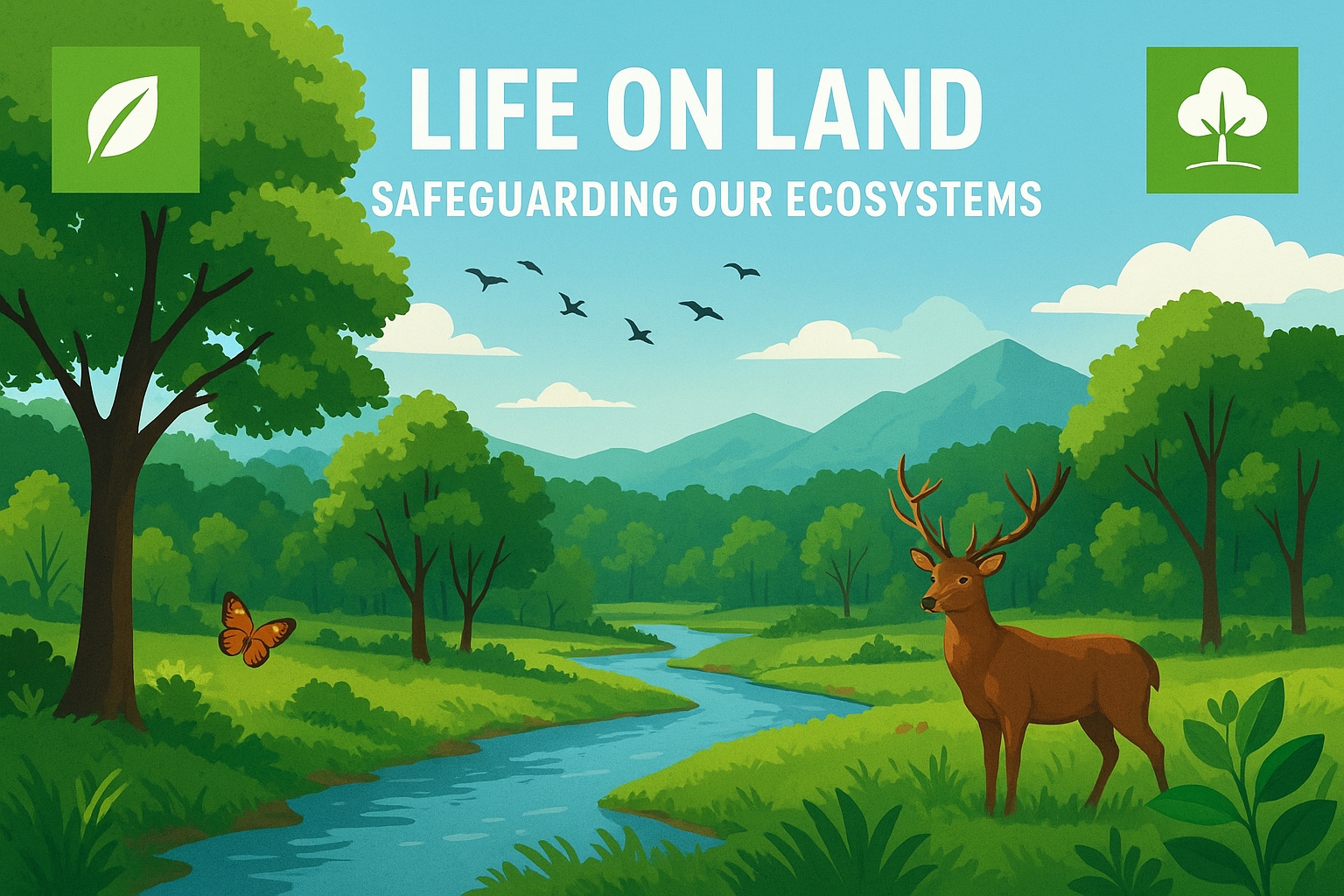SDG 15: Life on Land Safeguarding Our Ecosystems
Introduction
Life on land encompasses forests, deserts, mountains, drylands, and fertile plains — the very foundation of terrestrial biodiversity. SDG 15 focuses on protecting, restoring, and sustainably managing terrestrial ecosystems, halting deforestation, combating desertification, and preventing biodiversity loss. For humanity, the health of land is inseparable from food security, climate stability, and cultural survival. Without healthy ecosystems, human civilisation itself cannot thrive.
Global Perspective
Around the world, ecosystems are under immense pressure:
- Deforestation: Nearly 10 million hectares of forest are lost annually, mostly to agriculture and logging.
- Desertification: Over 2 billion hectares of land are degraded, threatening 3 billion people.
- Biodiversity Loss: One million species face extinction, with terrestrial habitats shrinking at alarming rates.
- Climate Connection: Forests and soils act as carbon sinks; their destruction accelerates global warming.
The urgency is not only environmental but also social — indigenous communities, small farmers, and rural poor depend directly on land for their survival.
Pakistan’s Perspective
Pakistan’s land faces triple stress: population pressure, climate vulnerability, and weak governance.
- Deforestation: Forest cover is less than 5%, among the lowest in the region, with illegal logging rampant.
- Desertification: Nearly 68% of Pakistan’s land is at risk of desertification due to overgrazing, deforestation, and unsustainable farming.
- Biodiversity Decline: Unique species like the Indus dolphin, snow leopard, and houbara bustard are endangered.
- Soil Erosion: Mountains and fertile plains lose millions of tons of topsoil annually.
- Urban Encroachment: Expanding cities consume agricultural land and forests.
While initiatives such as the Ten Billion Tree Tsunami, national parks expansion, and land rehabilitation programs show progress, enforcement and sustainability remain major challenges.
Islamic Perspective
The Qur’an strongly emphasizes the preservation of the earth, its greenery, and creatures. Man is appointed as a khalifah (steward), entrusted with nurturing—not destroying—the land.
Qur’anic Callouts
📖 “And do not cause corruption upon the earth after its reformation.” (Al-A‘raf 7:56)
📖 “It is He who produced gardens trellised and Un-trellised, date palms, crops of different shape and taste… eat of their fruit when they ripen, but pay their due on the day of harvest. And do not waste; indeed, He does not like the wasteful.” (Al-An‘am 6:141)
📖 “Corruption has appeared on land and sea because of what the hands of people have earned, so that He may let them taste part of what they have done, that they might return.” (Ar-Rum 30:41)
These verses make it clear: ecological imbalance, waste, and exploitation are forms of fasad (corruption). Islam links spiritual accountability with environmental responsibility. Protecting forests, wildlife, and soil is not optional but a divine duty.
Key Challenges for Pakistan
- Weak Governance: Forestry and wildlife laws often remain on paper.
- Unsustainable Agriculture: Excessive chemical use depletes soil health.
- Urban Expansion: Poor planning leads to habitat destruction.
- Climate Extremes: Glacial melting, floods, and droughts worsen land degradation.
- Awareness Gap: Environmental ethics rooted in Islamic teachings are underemphasized.
Economic Perspective: Pakistan’s Land and Livelihoods
The health of land is directly tied to Pakistan’s economy, food security, and poverty reduction. Degraded ecosystems translate into lost income, higher disaster costs, and weaker growth.
-
Agriculture Backbone: Agriculture contributes about 20% of Pakistan’s GDP and employs nearly 40% of the labor force. Desertification, soil erosion, and waterlogging reduce yields, pushing farmers into poverty and raising food prices.
-
Forestry Value: Pakistan’s forests supply timber, fuelwood, medicinal plants, and ecotourism potential. Yet deforestation costs the economy billions annually in lost resources and flood damages.
-
Livestock & Rangelands: Over 60% of rural households depend on livestock. Degraded pastures from overgrazing and desertification reduce milk and meat output, undermining food security.
-
Disaster Costs: Floods, droughts, and landslides linked to ecosystem degradation cause billions of dollars in economic losses each year. For example, the 2022 floods — worsened by poor land management — caused damages exceeding $30 billion.
-
Tourism & Biodiversity: Endangered wildlife and scenic landscapes could generate eco-tourism revenue, but poaching, pollution, and unplanned urbanization limit this potential.
-
Long-Term Growth: According to World Bank estimates, environmental degradation costs Pakistan around 6% of GDP annually — a massive economic burden that undermines sustainable development.
Bottom line: Ignoring land and biodiversity protection imposes hidden taxes on every Pakistani, from rising food costs to disaster recovery bills. Conversely, investing in land restoration, forest management, and eco-tourism can generate jobs, reduce poverty, and build climate resilience.
Strategic Recommendations
The recommendations here are strategic options. They must be piloted locally, tested, and adapted before full-scale implementation. Citizen participation and political will are non-negotiable.
- Afforestation & Reforestation: Sustain and expand large-scale plantation drives.
- Land Rehabilitation: Restore deserts, rangelands, and degraded agricultural soils.
- Wildlife Protection: Enforce bans on illegal hunting and establish safe habitats.
- Urban Land Planning: Promote green belts and protect agricultural land from encroachment.
- Faith-Based Advocacy: Incorporate Qur’anic environmental ethics into public campaigns.
Conclusion
Safeguarding life on land is essential for Pakistan’s survival and global ecological balance. Forests, soil, rivers, and biodiversity are the lifelines of future generations. If neglected, land degradation will deepen poverty, hunger, and climate vulnerability. If nurtured, it can turn Pakistan into a model of ecological resilience.
For Muslims, protecting the earth is an act of worship and trust — a reflection of obedience to the Creator.
🌍✨ SDG 15 is not just about saving forests — it is about fulfilling humanity’s covenant as guardians of the Earth.

